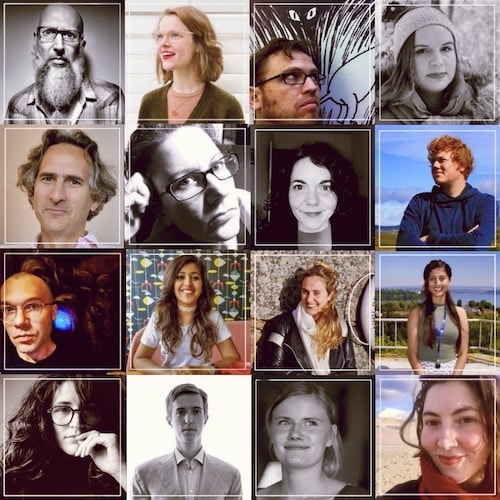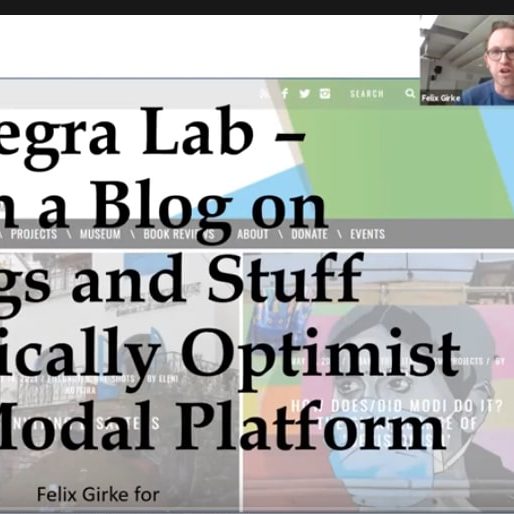At Allegra, we strive to find alternative modes of expression, new ways of working, collaborating, knowing and inquiring. Ultimately, we seek different ways of being anthropologists: collectively looking outwards to engage with the world at large and collectively looking inwards to change anthropology. In the wake of that fully dispensable year known as 2020, we determined to move Allegra forward by seeking to establish a broader alliance for a better anthropology. Through dialogue, we want to facilitate finely textured and well-reasoned approaches to comprehending peoples’ struggles, in whatever form they exist. Thus committed, we introduce and explain our new motto: anthropology for radical optimism.
It is easy to mock optimism — after all, look around you, what reason is there to be optimistic? Still, Allegra maintains that anthropology remains a worthwhile project: seeking to understand what it is to be human, especially in times of reckoning with the fragility of our global existence, by cherishing and embracing difference, both conceptually and personally.
It is easy to mock optimism.
We are not prepared to forfeit that ideal now: The never-ending pursuit of better understanding the lives of others — or, rather, the lives of each other — is a prerequisite for doing justice in a world rife with injustice. Our optimism stems not from naiveté, but rather from a firm awareness that justice follows from open-minded inquiry. Anthropology can not only offer positive change in this regard, but also itself be changed by that constant engagement. So, we found ourselves in agreement: to move forward, we must believe that there is something to move forward to.
“Allegra: Anthropology, Law, Art, World” — whoever paused to think about the header that graced our website for so many years? (Don’t look now. It’s gone.) These are all fine words, but as many people have remarked, conjunctions (or lists) are not the pinnacle of intellectual sophistication in approaching a subject matter. We do not disavow the terms now, either. But rather than offering a list of terms that are cornerstones of our work, we now want to be upfront about what we are about, what fuels our engagement, and what we aim to generate.
Anthropology: While we always have been open to inter-, cross- and transdisciplinary approaches, anthropology is what we are trained in, what some of us are by now even getting paid to do, and where we feel at home. We are perpetually frustrated with the state of academia, and we sometimes share the sentiment to burn everything down, but we will not be doing that: We have experienced that training in anthropology and anthropological practice can engender tremendous positive changes in people, and that’s something.
Law: Law was and still is central to our preoccupations and our work. Several members of our collective are card-carrying anthropologists of law. Law organizes much of our contemporary life and should thus be of key interest to anthropologists. Moreover, ethnography is particularly apt at capturing how people generate ideas of legality and illegality, justice and injustice, etc. and how these ideas play out in all their complexity and ambiguity in social life. And while an anthropological critique of the rule of law, and of human rights more fundamentally, remains necessary, to chart and demonstrate the emancipatory potential of law, of legal processes and of legal institutions is central to Allegra’s programme of radical optimism.
Art: We publish and curate art and regard it as a form of anthropological research, more than an object of inquiry. We endorse and support expression, increasingly in multimodal formats, be it in surreal forms or critiques of beauty. While academic institutions seem to hold artistic knowledge in low esteem, we do not. An established artist helps guide our editorial collective. Beyond intensifying our podcast-witchery, we are also planning to eventually establish “Allegra TV” and get more serious about our virtual museum.
World: An ethical anthropology must start from that premise: world. This term was also chosen with a wink at good old holism: nothing as such shall be excluded from our purview — no region, topic, or social context. We winked at “holism” because while we disavow its connotations of the seamless integration of parts and systems, we accept its insistence on inter-relatedness. The world is holistic because people, animals, plants, things, and materials are constantly transforming and we want to offer a broad and quickly reactive platform for spirited and timely debates, within and beyond academia.
This is still what Allegra does. But in the eight years that have passed since we coined that motto, Allegra has evolved from an ‘online experiment’ to a full-fledged anthropological alliance and a multimodal publication platform. Our contributors have diversified, our readership has increased, and with this wider outreach comes the need to more clearly convey what Allegra does and stands for.
To move forward, we must believe that there is something to move forward to.
With this in mind, we debated our new motto throughout 2020. We compared and contrasted many suggestions in heated Slack chats and Zoom meetings. Those ranged from the earnest and profound-ish to the whimsical and purely tongue-in-cheek. “Anthropology for radical optimism” emerged quite late in the debate as a reaction to the barrage of catastrophic news we all confronted in endless lockdown.
We know that to move forward, we have to be aware of the structures and inequalities that hold us back, all the stuff that frames our interactions and curtails our dreams. It’s not a naive optimism we’re embracing, but one in which we expect things will have to get messy. We dare to be optimistic to take a stance against individuated competition, and for academia as a collective endeavour, opening up spaces for creativity, intellectual curiosity, and the imagining of alternative futures. Whether we will truly be “radical” in this endeavour will have to be seen; but Allegra has always cultivated a streak of irreverence and subversion, and by not hedging our bets here, by not pursuing — say — “tentative” or “preliminary optimism”, we want to challenge ourselves to consider all the ways in which we as a collective and as a discipline can be optimistic.
We expect things will have to get messy.
The foundation for this optimism, in the end, lies in our Allies — all those who read Allegra, who review for Allegra, who write for Allegra, who share our stuff and who see something worthwhile in this project.
If you are optimistic about us, we will be optimistic about everything else.
————————————
Editorials are debated and elaborated by the editorial collective and appear semi-regularly as comments on current affairs and ongoing developments, and should be considered statements of intent. They also invite response and conversation.






I am happy to be a regular (monthy) small donor to Allegra. The “for”. in “An anthropology for radical optimism” reminds me of Clifford Geertz’s “models-of” and “models-for” and the proposition that religion exists to make the latter appear to be a function of the former.Could the same be said of the anthropology that Allegra proposes?
Dear John, thank you for your support! (everybody: We have a “donate” button on our website and welcome any amount!)
And that is an interesting question, indeed. Next to “of” and “for” there’s also “to” – As we wrote in our editorial: “To move forward, we must believe that there is something to move forward to.” We are more inclined to think of anthropology in terms of praxis than as function, maybe. The being of anthropology is in the doing …